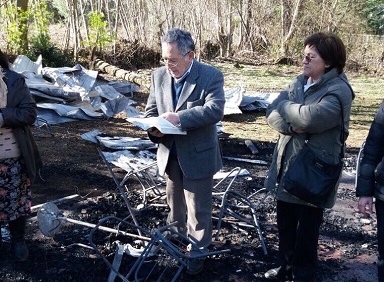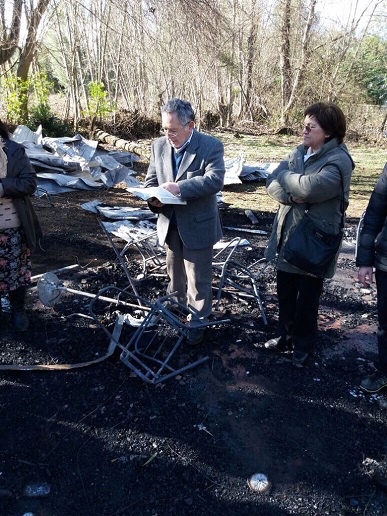
In an article first published by World Watch Monitor, ISRAEL VILCHES looks at what’s prompted a series of attacks on Christian churches in Chile…
Seven hours’ drive south of Chile’s capital, Santiago, in the Araucanía region, 27 churches have been burnt down in the past couple of years by a radical indigenous group, Weichan Auka Mapu.
The attackers leave behind messages spelling out the demands of the Mapuches, an ancestral tribe whose land was taken from them during Chile’s colonisation by Spanish Catholics. A high percentage of Mapuches now identify as Christian: 55 per cent Catholic, 32 per cent Protestant. But for some others, Christians are still seen as invaders.

AFTERMATH: Juan Mella, president of the local Pastors’ Council at the site of a burnt church. PICTURE: Israel Vilches.
“Each human being can have their own views with regard to faith, spirituality. We have never imposed our faith, but we have shared it with everyone because the Lord sent us to every nation, every tribe.”
– Juan Mella
Of the 20 churches burnt down between 2015 and 2016, 12 were Catholic, eight Protestant. In 2017, a further seven have been torched. These churches also served as schools, meeting places and shelters for those fleeing natural disasters. Many belonged to the poorest sectors of the poorest region in Chile, and were attended by Mapuches themselves.
The leader of an Assemblies of God church burnt down in July recalls the moment his attractive wooden church, built 15 years ago using money church members had raised, was reduced to ashes.
Juan Mella, who is also head of the local Pastors’ Council, said the event demonstrated an intolerance among the Mapuches.
“Each human being can have their own views with regard to faith, spirituality. We have never imposed our faith, but we have shared it with everyone because the Lord sent us to every nation, every tribe,” he said.
Abelino Apeleo, an Anglican bishop in Araucanía and also an ethnic Mapuche, said the primary issue is ignorance on the part of some of his fellow Mapuches.
“One sector of the Mapuche people – those with a more radical, violent attitude – blame the church for creating the problems of the Mapuches,” he said. “This is totally wrong. And of course we cannot support violence as a response.”
The incident that has received the most publicity took place in June, 2016, when masked men invaded a Sunday service at La Iglesia del Señor in Padre Las Casas, a city just south of the regional capital, Temuco. It has become known as the ‘Case of the Burnt Church’, and is the only case so far that has led to arrests.
A lady from the church, identified only by her initials, MC, explained what happened that day.
“I was inside with my children, my husband, my brother-in-law and my brothers,” she recalled. “They broke the windows and entered, firing their guns into the air, and then they threw us out. Then they came after us with large guns, machine guns, and they were wearing masks. They told us to leave or they would set us on fire as well – the children and all.”
The note the attackers left behind on that occasion read: “Christianity: accomplice of the repression of the Mapuche people.”
Four people were detained after the incident: Alfredo Tralcal, and three brothers – Benito, Pablo and Ariel Trangol Galindo, who are being investigated for links with Weichan Auca Mapu, a radical group that demands the release of Mapuche prisoners and has claimed responsibility for the church attacks.
The attacks have continued despite police efforts to find other possible perpetrators. In fact, after four more churches were burnt down on 20 September this year, many other congregations also received threats, forcing the police to station guards outside two Protestant churches in the region.
“I was inside with my children, my husband, my brother-in-law and my brothers. They broke the windows and entered, firing their guns into the air, and then they threw us out. Then they came after us with large guns, machine guns, and they were wearing masks. They told us to leave or they would set us on fire as well – the children and all.”
– MC, who was present when a church in Padre Las Casas was attacked in June, 2016.
“It isn’t only the attacks on the churches, it’s the pamphlets they leave behind, on which they write their demands and also provide a context for their behaviour,” said Luis Torres, in charge of the prosecution of the four men.
However, Pamela Nahuelcheo, acting for the defence, has called into question the evidence against her clients.
“It has been reported that the defendants were found at the place where the fire took place and were detained on the spot,” she said. “But that isn’t true. They were actually arrested two and a half hours after the fire, seven kilometres away from the church. One of the police officers said they smelt strongly of petrol and this is why they were detained. But there have been complaints about the actions of the police officers, that they fired shots at my defendants and beat them. And that the backpack supposedly found on them was not theirs at all.”
It was in this context and due to overwhelming pressure, including by the defendants, who had undertaken a four-month hunger strike, that the government in October said the charges against the men should be changed to arson, instead of terrorism.
There have been two further hearings since then, and prosecutor Luis Torres is determined the arsonists – whoever they are – are brought to justice.
“It can’t be normal to attack people attending a church service,” he said. “Children are attacked and thrown out of the church. They shoot at them to make them leave, and then the church is set on fire. If they didn’t do it and weren’t running away, why were their clothes wet? Why were some of their clothes torn? Why did they have evidence on them that links them directly to the attack?”
The local pastors say they continue to hope the situation will be resolved.
“We know that God protects us,” said Juan Mella. “And though our church was burned, we will rebuild it. And anyway, Jesus said: ‘Do not be afraid of those who kill the body but cannot kill the soul.’”
Bishop Apeleo added: “We will continue to bear witness to the Gospel. We have to apply the teachings of Jesus: to forgive, to have mercy and to love our enemies. At some point they may need our help and we will be there for them.”
“We know that God protects us. And though our church was burned, we will rebuild it. And anyway, Jesus said: ‘Do not be afraid of those who kill the body but cannot kill the soul.’”
– Juan Mella
The Pastors’ Council of Araucanía released a statement, saying: “It is the responsibility of the State to guarantee events like these don’t happen.”
It called on the government to protect its citizens, and bemoaned the decision to change the charges against the men, saying violence can never be justified, “whether by state, or non-state actors”.
The council demanded that the government “takes charge of the very serious situation…[which] led to a service being stopped, preventing 15 people – mostly women and children – from continuing with their meeting. They were driven out violently from their own church, and then forced to watch as their place of worship was burned down in front of them.
“It is the responsibility of the state to ensure that events such as these don’t happen again, by ensuring that those responsible are brought to justice, as well as protecting the victims and ensuring their church is rebuilt.”
Israel Vilches is a Chilean journalist and director of Cosmovisión. He is also a correspondent for Mundo Cristiano.






